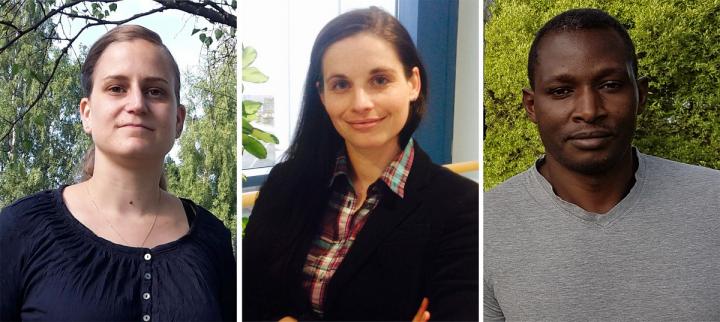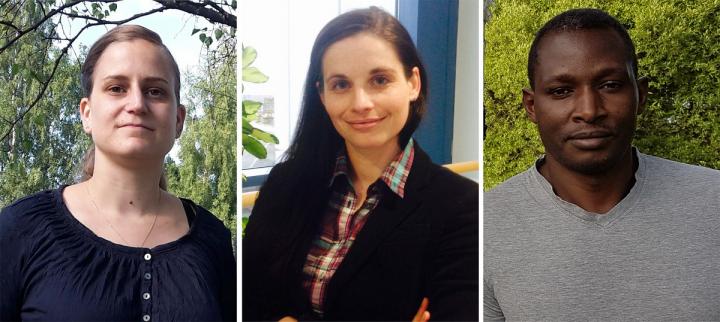
Credit: Umeå University
Reactive oxygen species (ROS) such as peroxides and superoxides are important signalling molecules in an organism's regulation of metabolism and inflammation. Accumulation of ROS have been linked to neurodegeneration and cancer. Researchers at Umeå University and Hospital of Halland in Sweden now reveal an unexpected function of ROS. They dampen a key inflammatory process and weaken the immune system´s ability to combat pathogens such as those that cause pneumonia. The findings are published in the July 2016 issue of the Cell Press Journal Immunity.
Nelson Gekara and his research group in the Laboratory for Molecular Infection Medicine Sweden (MIMS) and Department of Molecular Biology at Umeå University study how immune cells respond to bacterial infections. Activation of inflammatory processes is essential for the fight against infections and for subsequent tissue repair. However, if unrestrained, inflammation is counterproductive and result in inflammatory diseases such as rheumatisms or sepsis.
In collaboration with Torben Ek at the Hospital in Halland, the researchers studied the regulation of inflammation in immune cells from patients suffering from ataxia-telangiectasia (AT), serious genetic disorder and complex disease. People with AT often suffer from neurodegeneration, accelerated aging, proneness to cancer and a variety of autoimmune/inflammatory syndromes. Remarkably, the major cause of mortality in AT patients is bacterial lung infections.
AT results from mutations in the AT mutated (ATM) gene, which is involved in DNA repair and in maintaining redox balance in the cells. Hence, ATM deficiency is associated with genomic instability and elevated levels of ROS. In this project, the researchers were interested in why defects in ATM cause susceptibility to bacterial infections of the respiratory system.
Among the key inflammatory processes activated upon infection or tissue injury is the formation of multiprotein complexes called inflammasomes. Inflammasomes play a vital role in the secretion of cytokines that help to recruit immune cells to sites of infection/injury. While analysing how immune cells respond to bacterial infections, the researchers observed that immune cells from AT patients or mice lacking ATM exhibited reduced inflammasome activation. When studying the immune response in ATM deficient mice, they found that the ATM defect contributed to increased susceptibility to pneumonia. Further, they demonstrated that such defects were due to oxidative damage of inflammasome components by ROS.
"This was a rather unexpected discovery," says Saskia Erttmann, postdoctoral fellow, member of Gekara's lab and co-first author of the publication. "It is well accepted that, under homeostatic conditions, ROS contributes to the activation of many inflammatory pathways including inflammasomes. But our results demonstrate that ROS have a much more complex role. If excessively produced, ROS contribute to the disruption of inflammasome-dependent anti-microbial immune responses, much to the host's detriment."
"The findings bring to mind the old maxim 'An apple a day, keeps the doctor away'", says Nelson Gekara. "Fruits have a good claim to promote health and boost the immune system because they contain vitamins, which are potent antioxidants that help to prevent excessive accumulation of ROS."
"Some hallmarks of the serious genetic disease AT, including neurodegeneration and cancer, have been linked to oxidative stress," continues Nelson Gekara. "In fact, experimental antioxidant therapy has been suggested as a possible treatment option for these conditions. In light of the latest findings, it now remains to be tested whether antioxidant therapy can confer benefits to patients in their fight against bacterial infections such as those of the respiratory system."
###
Link to the publication (available on July 19): http://dx.doi.org/10.1016/j.immuni.2016.06.018
More information about Nelson O. Gekara's research: http://www.mims.umu.se/groups/nelson-gekara.html
About the publication: Immunity, article: Loss of the DNA Damage Repair Kinase ATM Impairs Inflammasome-Dependent Anti-Bacterial Innate Immunity. Authors: Saskia F. Erttmann, Anetta Hartlova, Marta Sloniecka, Faizal A.M. Raffi, Ava Hosseinzadeh, Tomas Edgren, Reza Rofougaran, Ulrike Resch, Maria Fällman, Torben Ek, and Nelson O. Gekara. DOI: 10.1016/j.immuni.2016.06.018.
For more information, please contact:
Nelson O. Gekara, assistant professor
The Laboratory for Molecular Infection Medicine Sweden (MIMS)
Department of Molecular Biology, Umeå University
Phone: +46 72-943 04 78
Email: [email protected]
Media Contact
Daniel Harju
[email protected]
46-725-522-918
@UmeaUniversity
http://www.umu.se/umu/index_eng.html





